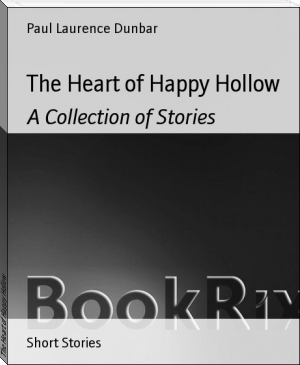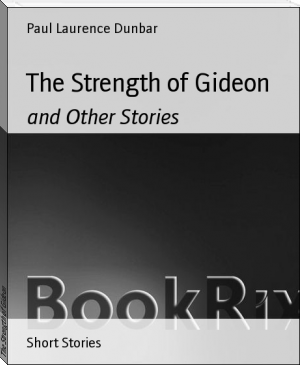The Heart of Happy Hollow - Paul Laurence Dunbar (large ebook reader .TXT) 📗

- Author: Paul Laurence Dunbar
Book online «The Heart of Happy Hollow - Paul Laurence Dunbar (large ebook reader .TXT) 📗». Author Paul Laurence Dunbar
Contents
Foreword
One: THE SCAPEGOAT
Two: ONE CHRISTMAS AT SHILOH
Three: THE MISSION OF MR. SCATTERS
Four: A MATTER OF DOCTRINE
Five: OLD ABE'S CONVERSION
Six: THE RACE QUESTION
Seven: A DEFENDER OF THE FAITH
Eight: CAHOOTS
Nine: THE PROMOTER
Ten: THE WISDOM OF SILENCE
Eleven: THE TRIUMPH OF OL' MIS' PEASE
Twelve: THE LYNCHING OF JUBE BENSON
Thirteen: SCHWALLIGER'S PHILANTHROPY
Fourteen: THE INTERFERENCE OF PATSY ANN
Fifteen: THE HOME-COMING OF 'RASTUS SMITH
Sixteen: THE BOY AND THE BAYONET
To My Friend Ezra M. Kuhns
Foreword
Happy Hollow; are you wondering where it is? Wherever Negroes colonise in the cities or villages, north or south, wherever the hod carrier, the porter, and the waiter are the society men of the town; wherever the picnic and the excursion are the chief summer diversion, and the revival the winter time of repentance, wherever the cheese cloth veil obtains at a wedding, and the little white hearse goes by with black mourners in the one carriage behind, there--there--is Happy Hollow. Wherever laughter and tears rub elbows day by day, and the spirit of labour and laziness shake hands, there--there--is Happy Hollow, and of some of it may the following pages show the heart.
The Author.
One
THE SCAPEGOAT
I
The law is usually supposed to be a stern mistress, not to be lightly wooed, and yielding only to the most ardent pursuit. But even law, like love, sits more easily on some natures than on others.
This was the case with Mr. Robinson Asbury. Mr. Asbury had started life as a bootblack in the growing town of Cadgers. From this he had risen one step and become porter and messenger in a barber-shop. This rise fired his ambition, and he was not content until he had learned to use the shears and the razor and had a chair of his own. From this, in a man of Robinson's temperament, it was only a step to a shop of his own, and he placed it where it would do the most good.
Fully one-half of the population of Cadgers was composed of Negroes, and with their usual tendency to colonise, a tendency encouraged, and in fact compelled, by circumstances, they had gathered into one part of the town. Here in alleys, and streets as dirty and hardly wider, they thronged like ants.
It was in this place that Mr. Asbury set up his shop, and he won the hearts of his prospective customers by putting up the significant sign, "Equal Rights Barber-Shop." This legend was quite unnecessary, because there was only one race about, to patronise the place. But it was a delicate sop to the people's vanity, and it served its purpose.
Asbury came to be known as a clever fellow, and his business grew. The shop really became a sort of club, and, on Saturday nights especially, was the gathering-place of the men of the whole Negro quarter. He kept the illustrated and race journals there, and those who cared neither to talk nor listen to someone else might see pictured the doings of high society in very short skirts or read in the Negro papers how Miss Boston had entertained Miss Blueford to tea on such and such an afternoon. Also, he kept the policy returns, which was wise, if not moral.
It was his wisdom rather more than his morality that made the party managers after a while cast their glances toward him as a man who might be useful to their interests. It would be well to have a man--a shrewd, powerful man--down in that part of the town who could carry his people's vote in his vest pocket, and who at any time its delivery might be needed, could hand it over without hesitation. Asbury seemed that man, and they settled upon him. They gave him money, and they gave him power and patronage. He took it all silently and he carried out his bargain faithfully. His hands and his lips alike closed tightly when there was anything within them. It was not long before he found himself the big Negro of the district and, of necessity, of the town. The time came when, at a critical moment, the managers saw that they had not reckoned without their host in choosing this barber of the black district as the leader of his people.
Now, so much success must have satisfied any other man. But in many ways Mr. Asbury was unique. For a long time he himself had done very little shaving--except of notes, to keep his hand in. His time had been otherwise employed. In the evening hours he had been wooing the coquettish Dame Law, and, wonderful to say, she had yielded easily to his advances.
It was against the advice of his friends that he asked for admission to the bar. They felt that he could do more good in the place where he was.
"You see, Robinson," said old Judge Davis, "it's just like this: If you're not admitted, it'll hurt you with the people; if you are admitted, you'll move uptown to an office and get out of touch with them."
Asbury smiled an inscrutable smile. Then he whispered something into the judge's ear that made the old man wrinkle from his neck up with appreciative smiles.
"Asbury," he said, "you are--you are--well, you ought to be white, that's all. When we find a black man like you we send him to State's prison. If you were white, you'd go to the Senate."
The Negro laughed confidently.
He was admitted to the bar soon after, whether by merit or by connivance is not to be told.
"Now he will move uptown," said the black community. "Well, that's the way with a coloured man when he gets a start."
But they did not know Asbury Robinson yet. He was a man of surprises, and they were destined to disappointment. He did not move uptown. He built an office in a small open space next his shop, and there hung out his shingle.
"I will never desert the people who have done so much to elevate me," said Mr. Asbury.
"I will live among them and I will die among them."
This was a strong card for the barber-lawyer. The people seized upon the statement as expressing a nobility of an altogether unique brand.
They held a mass meeting and indorsed him. They made resolutions that extolled him, and the Negro band came around and serenaded him, playing various things in varied time.
All this was very sweet to Mr. Asbury, and the party managers chuckled with satisfaction and said, "That Asbury, that Asbury!"
Now there is a fable extant of a man who tried to please everybody, and his failure is a matter of record. Robinson Asbury was not more successful. But be it said that his ill success was due to no fault or shortcoming of his.
For a long time his growing power had been looked upon with disfavour by the coloured law firm of Bingo & Latchett. Both Mr. Bingo and Mr. Latchett themselves aspired to be Negro leaders in Cadgers, and they were delivering Emancipation Day orations and riding at the head of processions when Mr. Asbury was blacking boots. Is it any wonder, then, that they viewed with alarm his sudden rise? They kept their counsel, however, and treated with him, for it was best. They allowed him his scope without open revolt until the day upon which he hung out his shingle. This was the last straw. They could stand no more. Asbury had stolen their other chances from them, and now he was poaching upon the last of their preserves. So Mr. Bingo and Mr. Latchett put their heads together to plan the downfall of their common enemy.
The plot was deep and embraced the formation of an opposing faction made up of the best Negroes of the town. It would have looked too much like what it was for the gentlemen to show themselves in the matter, and so they took into their confidence Mr. Isaac Morton, the principal of the coloured school, and it was under his ostensible leadership that the new faction finally came into being.
Mr. Morton was really an innocent young man, and he had ideals which should never have been exposed to the air. When the wily confederates came to him with their plan he believed that his worth had been recognised, and at last he was to be what Nature destined him for--a leader.
The better class of Negroes--by that is meant those who were particularly envious of Asbury's success--flocked to the new man's standard. But whether the race be white or black, political virtue is always in a minority, so Asbury could afford to smile at the force arrayed against him.
The new faction met together and resolved. They resolved, among other things, that Mr. Asbury was an enemy to his race and a menace to civilisation. They decided that he should be abolished; but, as they couldn't get out an injunction against him, and as he had the whole undignified but still voting black belt behind him, he went serenely on his way.
"They're after you hot and heavy, Asbury," said one of his friends to him.
"Oh, yes," was the reply, "they're after me, but after a while I'll get so far away that they'll be running in front."
"It's all the best people, they say."
"Yes. Well, it's good to be one of the best people, but your vote only counts one just the same."
The time came, however, when Mr. Asbury's theory was put to the test. The Cadgerites celebrated the first of January as Emancipation Day. On this day there was a large procession, with speechmaking in the afternoon and fireworks at night. It was the custom to concede the leadership of the coloured people of the town to the man who managed to lead the procession. For two years past this honour had fallen, of course, to Robinson Asbury, and there had been no disposition on the part of anybody to try conclusions with him.
Mr. Morton's faction changed all this. When Asbury went to work to solicit contributions for the celebration, he suddenly became aware that he had a fight upon his hands. All the better-class Negroes were staying out of it. The next thing he knew was that plans were on foot for a rival demonstration.
"Oh," he said to himself, "that's it, is it? Well, if they want a fight they can have it."
He had a talk with the party managers, and he had another with Judge Davis.
"All I want is a little lift, judge," he said, "and I'll make 'em think the sky has turned loose and is vomiting niggers."
The judge believed that he could do it. So did the party managers. Asbury got his lift. Emancipation Day came.
There were two parades. At least, there was one parade and the shadow of another. Asbury's, however, was not the shadow. There was a great deal of substance about it--substance made up of many people, many banners, and numerous bands. He did not have the best people. Indeed, among his cohorts there were a good many of the pronounced rag-tag and bobtail. But he had noise and numbers. In such cases, nothing more is needed. The success of Asbury's side of





Comments (0)